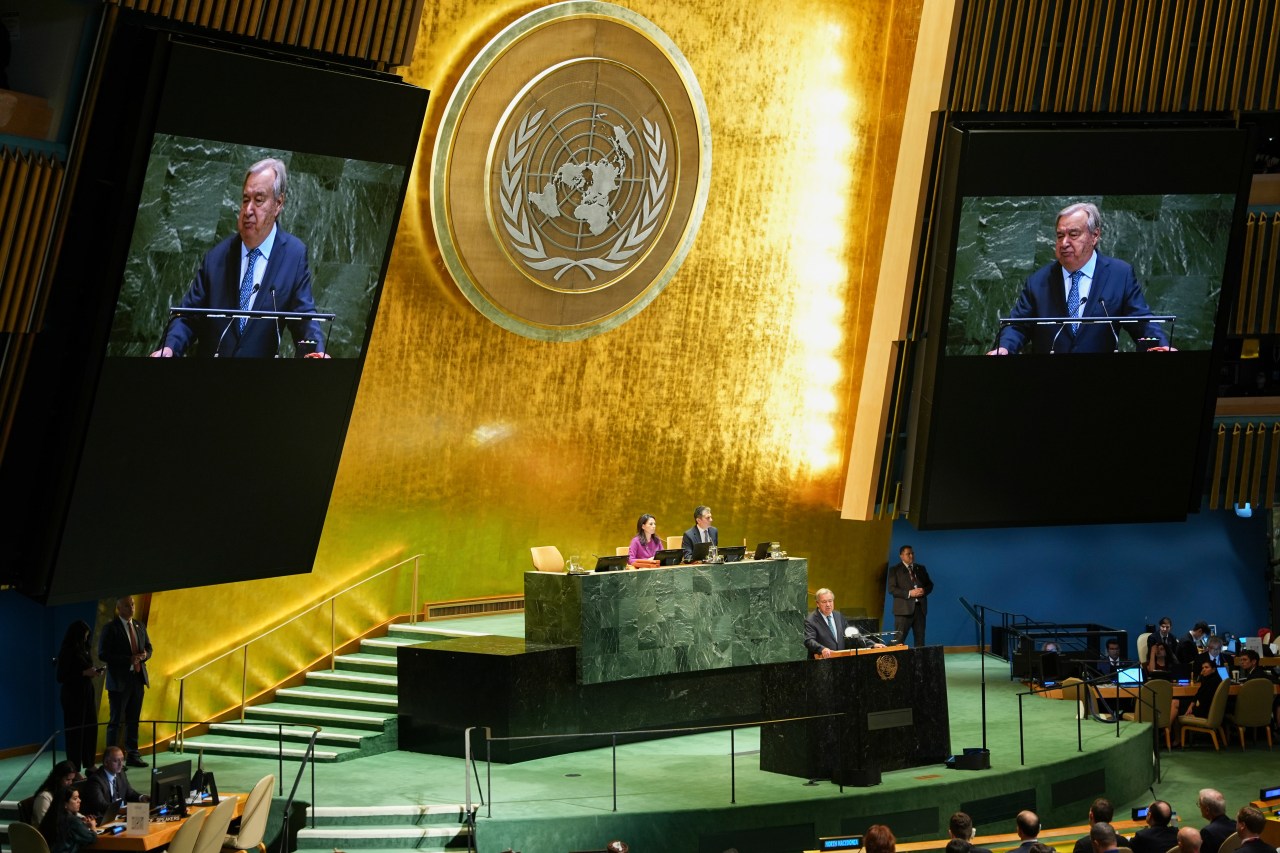UNITED NATIONS (AP) — With global peace and progress under siege, United Nations Secretary-General Antonio Guterres challenged world leaders Tuesday to choose a future where the rule of law triumphs over raw power and where nations come together rather than scramble for self-interests.
Guterres reminded leaders that the U.N.’s founders faced similar questions 80 years ago but told today’s assembly that the choice between peace or war, law or lawlessness, cooperation or conflict, is “more urgent, more intertwined, more unforgiving.”
“We have entered an age of reckless disruption and relentless human suffering,” he said in his annual “State of the World” speech. “The pillars of peace and progress are buckling under the weight of impunity, inequality and indifference.”
Despite the internal and external challenges confronting the U.N., Guterres and General Assembly President Annalena Baerbock urged members not to give up. “If we stop doing the right things, evil will prevail,” Baerbock said in her opening remarks.
### A Multipolar World and Rising Challenges
Looking broadly at the changing global landscape, Guterres noted the world is becoming increasingly multipolar — a subtle nod to rising economic powers China and India and a clear challenge to the U.S. insistence on maintaining superpower status.
While a multipolar world can be more diverse and dynamic, the U.N. chief warned that without international cooperation and effective global institutions, there can be “chaos.”
### President Trump’s Address: Strong Borders and Criticism of the U.N.
President Donald Trump delivered a nearly hour-long speech, asserting that the United States has the strongest borders, military, friendships, and “the strongest spirit of any nation on the face of the earth.” He proclaimed, “This is indeed the golden age of America.”
However, Trump criticized the United Nations, describing it as ineffective. “All they seem to do is write a really strongly worded letter,” he said, suggesting the U.N. fails to follow through on conflict resolution efforts.
During his remarks, an escalator unexpectedly stopped as Trump and First Lady Melania Trump rode it toward the Assembly hall, and his teleprompter malfunctioned. A U.N. official explained that the escalator’s stop mechanism was triggered inadvertently by someone from the president’s party running ahead, and the White House was managing the teleprompter.
Despite his criticisms, Trump acknowledged the U.N.’s potential. “Our country is behind the United Nations 100%,” he told Guterres in a meeting soon after his speech. “I may disagree with it sometimes, but I am so behind it because the potential for peace at this institution is great.”
### Call for Peace and Addressing Conflicts
Guterres stressed the primary obligation of world leaders: to choose peace. Without naming specific countries, he urged all parties—including members within the General Assembly—to stop supporting Sudan’s warring factions.
He also condemned the situation in Gaza in strong terms, without explicitly naming Israel. Guterres described the scale of death and destruction as the worst in his nearly nine years as secretary-general, stating, “Nothing can justify the collective punishment of the Palestinian people.”
While refraining from labeling the actions as genocide, Guterres referenced a case brought by South Africa to the International Court of Justice under the genocide convention. He emphasized the legally binding provisional measures issued by the court, aimed foremost at protecting Palestinian civilians.
Since the court’s ruling in January 2024, the killings in Gaza have intensified, and famine has been declared in parts of the territory. Guterres insisted that the court’s measures “must be implemented — fully and immediately.”
### Financial Challenges and Aid Cuts
The U.N. is also grappling with financial difficulties as the U.S. and some other nations have pulled back funding or delayed paying dues. Guterres warned that aid cuts are “wreaking havoc” and called them “a death sentence for many.”
### Israeli-Palestinian Conflict Takes Center Stage
With growing global support for a Palestinian state, Israel’s devastating war in Gaza dominated discussions at the Assembly.
Turkey’s President Recep Tayyip Erdoğan lamented the absence of Palestinian President Mahmoud Abbas, who was denied a U.S. visa. Speaking on behalf of “our Palestinian brothers and sisters whose voices are being silenced,” Erdoğan highlighted the increasing recognition of a Palestinian state and called on nations that have yet to do so to act “as soon as possible.”
Indonesia’s President Prabowo Subianto also voiced strong support for the Palestinians, warning that “human folly, fueled by fear, racism, hatred, oppression and apartheid threatens our common future.”
“Every day we witness suffering, genocide and a blatant disregard for international law and human decency,” said the leader of the world’s most populous Muslim nation. “In the face of these challenges, we must not give up. … We must draw closer, not drift further apart.”
### A Packed Schedule and Widening Issues
The General Assembly’s week of meetings began Monday with a conference focused on the Israeli-Palestinian conflict and the idea of a two-state solution, co-chaired by France and Saudi Arabia.
Tuesday’s notable speakers included Brazilian President Luiz Inacio Lula da Silva, Jordan’s King Abdullah II, French President Emmanuel Macron, South Korea’s President Lee Jae Myung, and South African President Cyril Ramaphosa.
Continuing a longstanding tradition, Brazil’s Lula da Silva opened the speeches, voicing concern over the waning authority of the U.N. “We are witnessing the consolidation of an international order blocked by repeated concessions to power play,” he said.
### Geopolitical Complexities Amid Calls for Unity
Although this year’s debate theme is “Better Together,” the discussions underscored the many ways the world faces increasing turmoil.
Gaza’s crisis already seized international attention, with nearly all U.N. member states scheduled to deliver speeches during the Assembly’s six-day session.
The current speakers list includes 89 heads of state, 43 heads of government, 10 vice presidents or deputy prime ministers, and 45 foreign ministers and other high-level officials, reflecting the Assembly’s pivotal role amid escalating global challenges.
https://wgntv.com/news/international/ap-international/ap-at-un-world-leaders-meet-to-try-to-make-a-troubled-planet-better-together-but-can-they/

Be First to Comment